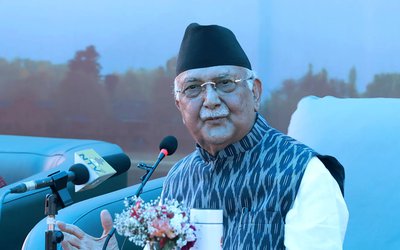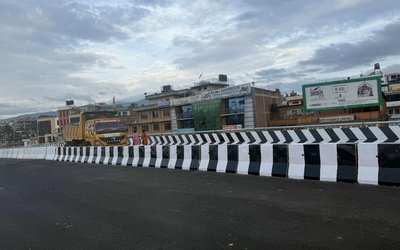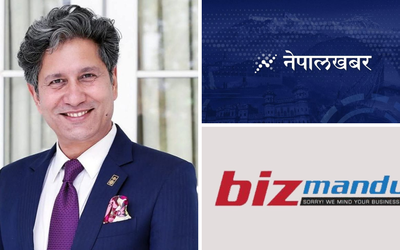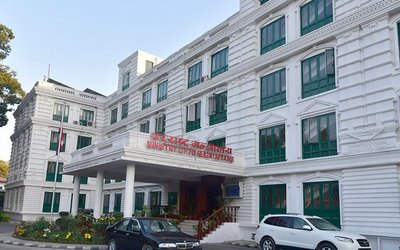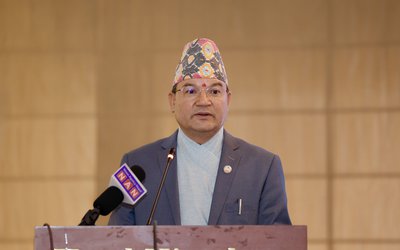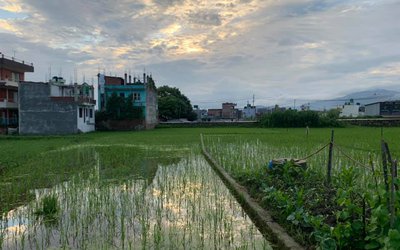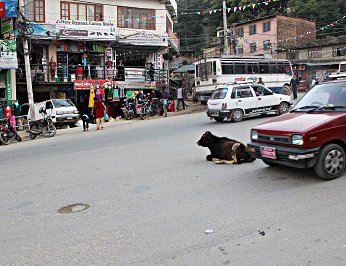
Nepal is full of contradictions. The first thing you notice upon arrival in its capital, is its insane traffic. Yet whenever you enter a door, you find this unexpected, well hidden, paeceful place, with soft pillows everywhere and relaxing music playing in the background. It's as if there are no worries – or hurries – in the world. Until you step outside again. Chaos and peace go together in harmony in Kathmandu, in a way you can't find in any other country.
Kathmandu is a lot to take in all at once. It's as if traffic rules don't exist and people just drive wherever they see a possibility. And they see possibilities where I see absolutely none. Cars, motorcycles, bicycles and pedestrians circle around each other with just a few millimeters space in between them.
There are no traffic lights or turn indicators to be found. People honk their way through the city, every once in a while stretching their arm through an open window to point out that they're about to make a turn.
Napping cows
But the most surprising thing for foreigners to see, is that cows are claiming their place on the road as well. As if it's not hard enough to get through traffic as it is, without animals mixing in, cows lazily wander around, occasionally stopping to take a nap in the middle of the street. I have no idea how they do it, with all the honking, shouting and racing going on around them, but they manage to fall asleep, leaving all road users to circle around the sacred bovine using even more dangerous off-road routes. Cows need to be respected, but if it endangers the traffic situation (and also their own lives!), there's a need for proper solutions.
Nepalese people might be used to it, but tourists and travelers still get a mini-heart attack every time a car or motorcycle narrowly races passed them. A French volunteer in Kathmandu saw three different accidents with microbuses on her way to Pokhara. But there are many, many more stories about traffic accidents.
Awareness campaigns
Even in Guatemala, where I spent 7 months volunteering, the roads were better maintained than they are here. Just the installment of some traffic lights might prevent a few accidents, as awareness campaigns may help to stop drivers from driving wherever they can. Or actually, can't.
Where people often think Asia can be easily compared to Latin-America, more and more things prove that that's not true. For example, while you're slaloming your way through the crowded streets in Kathmandu – pavements don't exist, and even if they did, they would probably be used as an extension of the road – there's a lot of people pulling your arms asking whether you'd be interested in jewellery, marihuana, or any music instrument. But I can't name one country where they try to sell as respectful as they do here. In Latin-America, they would never except a no this easily. Here, they're just as nice to you as they were before you rejected them.
Traditions
But then again, Nepal isn't comparable to any other country. There's so many tourists here, yet still Nepalese people manage to hold on to their traditions. In Guatemala, also a very traditional country, inhabitants have adapted themselves to tourists. In Nepal, it's the tourists that adjust themselves to the country and its culture. Nepal sticks to its guns, and that's how it's supposed to be.
Even though changes are most certainly needed. Plastic might be banned, but as long as people don't stop littering on the streets, this won't help much. There are special women's seats in buses, but as long as men keep sitting on them, there's no use in their existence. Nepal has to hold on to their values and culture, it's what makes this country so unique, but in the meantime, changes need to take form. Soon.


